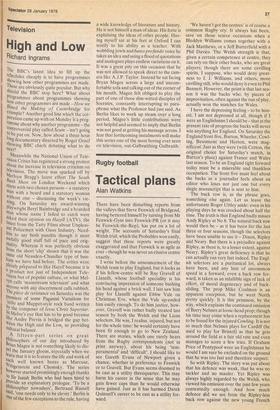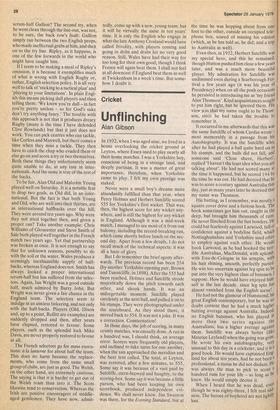Rugby football
Tactical plans
Alan Watkins
There have been disturbing reports from the valleys that Steve Fenwick of Bridgend, having bettered himself by turning from Mr Fenwick-Gym into Fenwick-PR (or it may be Fenwick-the-Rep), has put on a lot of weight. The accounts of Saturday's final Welsh trial, which the Probables won easily, suggest that these reports were greatly exaggerated and that Fenwick is as agile as ever—though he was never an elusive centre exactly.
I write before the announcement of the Welsh team to play England, but it looks as if his fellow-centre will be Ray Gravel! of Llanelli, whose football speciality is his convincing impression of someone bashing his head against a brick wall. I last saw him play for Llanelli against Ebbw Vale on Christmas Eve, when the Vale up-ended him easily enough. To do him justice, however, Gravell was rather badly treated last season by both the Welsh and thd Lions selectors. He was, I realise, injured, but not for the whole time: he would certainly have been fit enough to go to New Zealand. There are stories, which one rarely hears from the Rugby correspondents (not in print anyway), about his being `temperamental' and 'difficult'. I should like to see Gareth Evans of Newport given a chance, whether in preference to Fenwick or to Gravell. But Evans seems doomed to be cast as a utility threequarter. This may harm his career in the sense that he may gain fewer caps than he would otherwise have gained. Just as it has harmed Derek Quinnell's career to be cast as a utility forward. 'We haven't got the centres' is of course a common Rugby cry. It always has been, save on those scarce occasions when a Bleddyn Williams comes together with a Jack Matthews, or a Jeff Butterfield with a Phil Davies. The Welsh strength is that, given a certain competence at centre, they can rely on their other backs, who are great players; though there are some cavilling spirits, I suppose, who would deny greatness to J. J. Williams, and others, more cavilling still, who would deny it even to Phil Bennett. However, the point is that last season it was the backs who, by pieces of improvisation, often against the run of play, actually won the matches for Wales.
I have the depressing feeling — to be honest, I am not depressed at all, though if I were an Englishman I should be — that at the present rate of progress the backs will never win anything for England. On Saturday the England front five, Burton, Wheeler, Cowling, Beaumont and Horton, were magnificent. Just as they were (with Cotton, the original choice for Saturday's match, in Burton's place) against France and Wales last season. To be an England tight forward today must be a miserable and thankless occupation. The front five must feel about the backs as a journalist feels about an editor who loses not just one but every single manuscript that is sent to him.
The back row is, as the phrase goes, something else again. Let us leave the unfortunate Roger Uttley aside: even in his playing days he was crocked about half the time. The truth is that England badly misses Andy Ripley at No 8. The natural back row would then be — as it has been for the last three or four seasons, though the selectors have been unable to see it — Dixon, Ripley and Neary. But there is a prejudice against Ripley, as there is, to a lesser extent, against Neary. Ripley's great deficiency is that he can actually run very fast indeed. The English selectors are a puritanical lot, always have been, and any hint of uncommon speed in a forward, even a back row forward, is taken as an infallible sign of lack of effort, of moral degeneracy and of backsliding. The prop Mike Coulman is an 'apparent exception, but he went North pretty quickly. It is this primness, by the way, which explains the continued omission of Barry Nelmes at loose-head prop; though his time may come when a replacement has to be found for the injured Cowling. It is not so much that Nelmes plays for Cardiff (he used to play for Bristol) as that he gets around the field at a fair old rate and even manages to score a few tries. If Graham Price of Pontypool were an Englishman he would I am sure be excluded on the ground that he was too fast and therefore suspect.
So with Ripley. The story was put about that his defence was weak, that he was no tackler and no mauler. Yet Ripley was always highly regarded by the Welsh, who viewed his omission over the past few years contentedly enough. And how much defence did we see from the Ripley-less back row against the new young French scrum-half Gallion? The second try, when he went clean through the line-out, was not, to be sure, the back row's fault: Gallion simply ran between the two English props, who made ineffectual grabs at him, and then on to the try line. Ripley, as it happens, is one of the few forwards in the world who might have caught him.
If I seem to be making a meal of Ripley's omission, it is because it exemplifies much of what is wrong with English Rugby or, rather, English selection policy. It is all very well to talk of 'sticking to a tactical plan' and 'playing to your limitations'. In plain English this means picking dull players and then telling them: 'We know you're dull — in fact you're pretty useless — so for God's sake don't try anything fancy.' The trouble with this approach is not that it produces dreary Rugby (many is the time I have defended Clive Rowlands) but that it just does not work. You can pick centres who can tackle, like Corless and Maxwell, but there comes a time when they miss a tackle. They then have to catch the chap who evaded them or else go on and score a try or two themselves. Both these things they unfortunately seem quite unable to do, at any rate in internationals. And the same is true of the rest of the backs.
To be fair, Alan Old and Malcolm Young played well on Saturday. It is a notable feat to drop two goals, as Old did, in an international. But the fact is that both Young and Old, who are well into their thirties, are as international halfbacks over the hill. They were around ten years ago. Why were they not tried together then, and given a proper run? Take another example: Chris Williams of Gloucester and Steve Smith of Sale both played well together in the French match two years ago. Yet that partnership was broken at once. It is not enough to say that for unknown reasons, possibly to do with the soil or the water, Wales produces a seemingly inexhaustible supply of halfbacks, whereas England does not. Smith has always looked a proper international scrum-half but has suffered from the selectors. Again, Ian Wright was a good outside half, much admired by Barry John. But Wright was never given a fair chance in the England team. The selectors seem to indulge in an aimless tinkering, and not only with the half-backs. Players (Old, Dixon and, up to a point, Rollitt are examples) are suddenly dropped and then, after years have elapsed, restored to favour. Some players, such as the splendid lock Mike Davis, are never properly restored to favour at all.
The French selectors go for mass executions: a la lanterne for about half the team. This does no harm because the replacements, who come from the same small group of clubs, are just as good. The Welsh, on the other hand, are extremely cautious. The saying is that it is harder to get out of the Welsh team than into it. The Scots likewise tend to conservatism. Whereas the Irish are positive encouragers of middleaged gentlemen. They have now, admit
tedly, come up with a new, young team: but it will be virtually the same in ten years' time. It is only the English who engage in what the late Anthony Crosland would have called frivolity, with players coming and going in dribs and drabs for no very good reason. Still, Wales have had their way for too long for their own good; though I think France will again beat them. I shall not feel at all downcast if England beat them as well at Twickenham in a week's time. But somehow I doubt it.



































 Previous page
Previous page